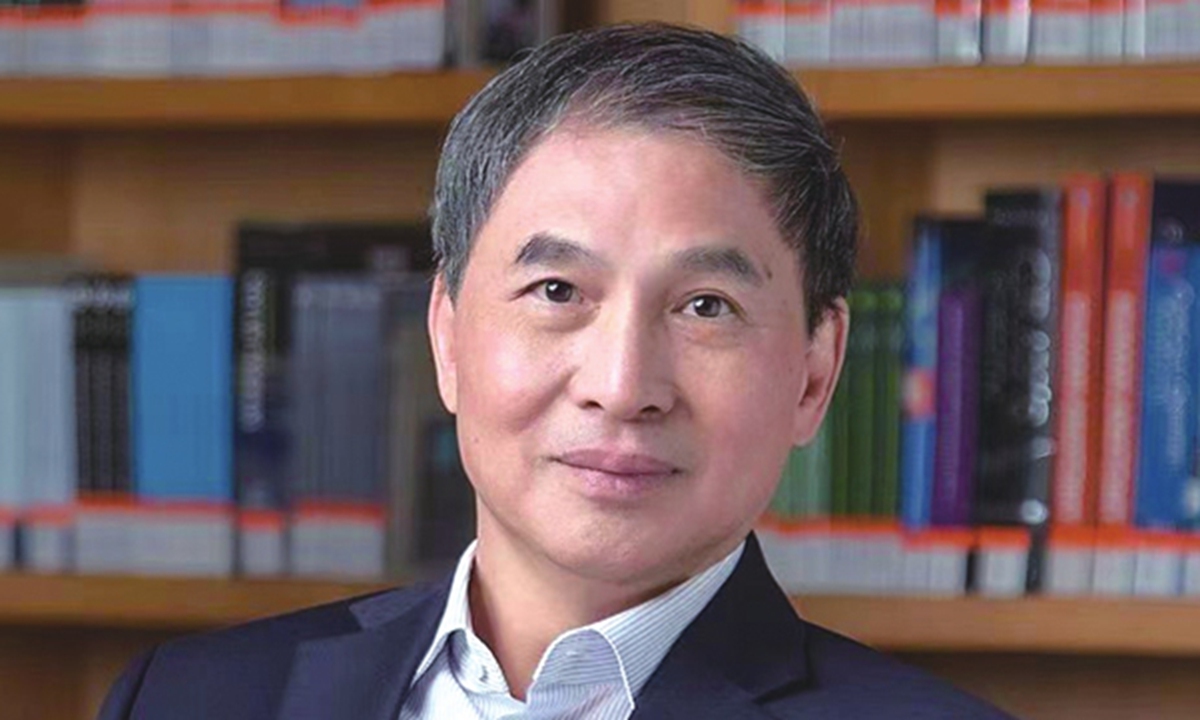
Photo: VCG
Editor's Note: From many perspectives, the world is in danger of being drawn into long-term trouble. A growing risk of new conflicts is bubbling amid a lingering pandemic, the ongoing Russia-Ukraine conflict, the plague of soaring inflation and an energy crisis. Against this complex backdrop, what will 2023 look like? Who should we look toward as the anchor of stability in the world? Global Times
(GT) reporter Wang Wenwen talked to Zheng Yongnian
(Zheng), professor at the Chinese University of Hong Kong, Shenzhen, and president of The Institute for International Affairs, Qianhai. This is the fifth piece of the Global Times series - "Looking for an anchor of stability in 2023."
GT: What do you think is the biggest surprise of 2022?
Zheng: At the international level, the biggest surprise of 2022 is the acceleration of the drastic changes of geopolitics. Geopolitics has been changing since former US president Donald Trump launched the trade war against China. The COVID-19 pandemic has also influenced these geopolitical changes to some extent. But what truly triggered the drastic changes of geopolitics in 2022 is the Russia-Ukraine conflict. It has not ended today, and we don't know when and how it will end. It is a regional war, but a big test to world geopolitics.
The Ukraine crisis is the result of the eastward expansion of NATO, with Ukraine being only a pawn. The US, as the actor behind the crisis, has never thought of ending the war. US Defense Secretary Lloyd Austin declared in April last year that Washington wanted to see Russia weakened militarily and unable to recover quickly. Now Russia wants negotiations, but has not received any response. Nonetheless, it is impossible for Russia to face the defeat that the US wishes for.
The impact of the Russia-Ukraine conflict on world geopolitics is much more than the impact of the China-US trade spat or the COVID-19 pandemic.
GT: Under what circumstances will a turning point occur?
Zheng: We feel regrettable about war, but it is the eastward expansion of NATO made Russia feel insecure. Russia's objectives in the war are shrinking., and this is Russia's consideration based on realism. But changes in Russia does not mean a turning point has occurred. The war will only end when both sides have the will for negotiations. Ukraine is not fighting alone, it has the West at its back. So far, this side has no will for negotiations, and has sought to escalate the war. Therefore, the geopolitical struggle will continue. It depends on the US' strategic design in Europe. If the US truly wants to weaken Russia, the Ukraine crisis will be a long-lasting one.
Other major powers such as Turkey, India and China all hope for peace and an end of the war. But they are not direct stakeholders and can only play a supplementary role. The occurrence of a turning point depends on the major adjustment of the relations of the US and Russia, two major powers in the world.
GT: What will be the biggest risky point in 2023?
Zheng: 2023 will not be better than 2022. We don't know the outcome of the Russia-Ukraine conflict. On the one hand, Russia cannot afford a conventional war. On the other, the US and Europe do not have to bear the direct cost of the war, as it is a proxy war.
In 2023, it is highly likely that the West will face economic recession. Historically speaking, when geopolitical changes and economic recession mingle, they will generate not only physical reaction, but also chemical. If we think of the first World War and the second World War, we cannot be optimistic.
GT: What is the biggest opportunity for China in 2023?
Zheng: Opportunities coexist with crises. If one cannot see the crisis, he would not seize the opportunity or even become part of the crises. For China, it may face the crisis of being dragged into deeper geopolitical struggles. The Russia-Ukraine conflict is a buffer for China. From Trump to Biden, the main target of the US government is China, while the conflict has delayed the US' strategic shift to the Indo-Pacific region. Now it seems that it will continue to be delayed.
If China implements wise policies, the West's economic recession may be an opportunity for it, because capital always seeks out stability. Among all the regions, Asia with China at the center is the most stable.
Strategically, if China can do its own things well, it can effectively avoid becoming the center of this geopolitical whirlpool. The US' Indo-Pacific strategy aims at China, but why hasn't it pushed forward as the US planned? Because of China's strategy. The US engages in confrontation and forming cliques, but China seeks open and inclusive multilateralism, which is different from the multilateralism the US pursues, which is exclusive, and targets a third country.
Turkey is pursuing its dependent foreign policy. India does not follow the US blindly, but uses the opportunity to develop itself as a major power. China should not view India as the US' vassal simply because there are border issues between China and India, but should view India as an independent force.
Opportunity comes out of the proper judgment and reaction to the situation.

Zheng Yongnian Photo: Courtesy of Zheng
GT: China has adjusted its pandemic prevention and control measures. What changes will it bring to the world?
Zheng: China's opening will benefit the flow of labor and other production elements. The opening of China, the world's second biggest economy, will affect its own economy and world economy. China has adjusted its policy, but it does not mean China has abandoned pandemic prevention and control. It is the Chinese public, not the West, that has the final say if China's adjusted policy works well. If the Chinese people can go abroad safely, and if foreign capital and businesses flock in, the West has no reason to smear China. The West has claimed that China has opened without any preparation, which is wrong -- China had prepared for a long time.
GT: Which is the anchor of stability in 2023, China or the US?
Zheng: China of course. From the geopolitical point of view, the US is busy with the Ukraine crisis while paying attention to the Indo-Pacific. China has been steady, which is the right response. On the Taiwan question, China has made it clear to the international community that it will safeguard its core interests at all costs. In other areas, China will maintain its strategic firmness.
It is because of China's firmness that geopolitics in Asia remains stable. China will not take the initiative to trigger a conflict with the US in the South China Sea issue or the Taiwan question. This has made the US somewhat pragmatic in China-related affairs. When it comes to their geopolitical interests, Asian countries have their own judgment. No country in Asia wants to become the next Ukraine after they see what the US has done to Ukraine.
As China has adjusted its pandemic prevention and control measures, China is shifting its focus to the economy one more time. This is an opportunity for the development of both China itself and Asian countries. The region whose countries and economies stress economic development will be stable. If we look at major countries in Asia: China, India, and Indonesia all devote themselves to economic development, and they pursue joint development, not isolated development. Asian economies depend on each other, and Asia as a whole is rising. We must avoid the dual impact of geopolitical conflict and economic recession in the US and Europe extending itself to Asia.
GT: The US carries out its China containment strategy while at the same time touts about cooperation with China. Will such contradiction of the US' China policy continue?
Zheng: It is wrong for the Chinese people to either fear the US, be pro-US or despise the US. We must seek truth from the facts and be firm. What the US has been doing over the years is to contain China, but China has remained stable. Even when the US provoked China in the Taiwan question, China has kept calm. Therefore, China should not look down on itself. As long as China is rational, it has enough capability and strength to see out the geopolitical challenges caused by the US.
GT: Will countries mired in troubles launch wars to shift domestic contradictions? Or will countries across the world join hands to walk out of dilemmas?
Zheng: If the US and Europe get into trouble, and if economic recession is mixed with geopolitical changes, war is likely to occur, as history has shown. If a regional war cannot be controlled, it will escalate into a world war.
Many developing countries are at the edge of survival due to various reasons like climate change, such as some countries in the Pacific Island, Africa and the Middle East. After World War II, there was an international system with the UN at the core. Member states help maintain the international system, and when a humanitarian crisis took place, there could be some measures. But in 2023, humanitarian crises are expected to occur constantly. The international system with the UN at the core is still there, but is unable to play the role people expect. It has become less and less relevant and incapable.
What crisis is the current world order facing? International public goods are too few, while international public bads are too many. In international public goods such as the UN, WHO, WTO and free trade, big countries are supposed to play a major role, and small countries can take a free ride. But today, it is not that the world is incapable of providing enough international public goods. Rather, the world economy and technology have developed so well that it can produce public goods. But the lack of public goods is attributed to the lack of cooperation among major powers. Meanwhile, to reduce international public bads such as climate change, nuclear proliferation and public health crises, cooperation is needed among major powers.
So now, people are calling for the reconstruction of world order. Against this background, China must shoulder the responsibility as a major power. Even the US opposes China, except on issues that touch on China's core interests, China should treat the US in a responsible manner. This will help China win more countries, especially developing countries and even developed ones. China must hold on to the spirit of what is called "true multilateralism" - what I call open and inclusive multilateralism. With this principle, China can play a significant leadership role in the reconstruction of world order.





